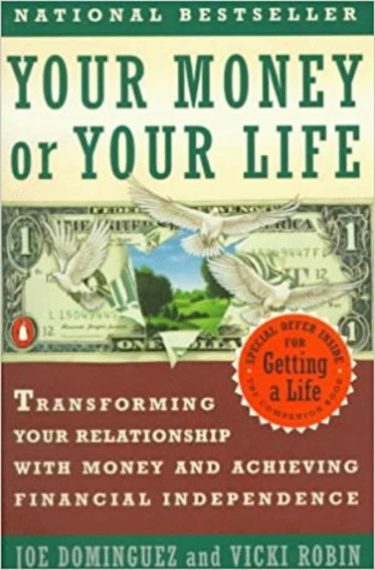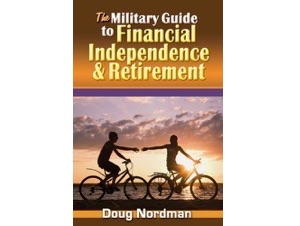Table of Contents
- Stay on Active Duty for as Long as it’s Challenging and Fulfilling.
- Learn About the Reserves and National Guard– Just in Case the Active-Duty Fun Stops.
- Save and Invest as Much as You Can for Financial Independence…
- … Because Then You’ll Have Choices.
- Today, at age 57, I’d happily trade a million dollars of our net worth to recover the overtime life that I worked during my 30s.
Many career servicemembers get locked into a single line of thinking that drives them to put their head down and continue their military career until reaching 20 years of active duty service, regardless of the cost.
I’m here to tell you that if you are struggling with the commitment of serving 20 years on active duty, you have options.
This post gets personal. Let me give you permission to think about these questions in your own career.
A reader writes:
I’m active duty and coming up on year #9 this May. I have owned your book for a few years and dig into the blog content on occasion. Love it!
My question has to do specifically with one of the closing paragraphs in your last post on the BRS:
“I should’ve left active duty for the Reserves at the 12-year point (when we started a family and my career priorities changed). The money would’ve worked out about the same, and we would’ve reached financial independence within a year or two of when we did, but our quality of life would’ve been way better.”
This is what I wrestle with the most. I dread the slog that years 12 through 20 will bring and the separation it will cause from my family. Can you expound on that, or point to a place you have already expounded on these statements?
Specifically: How would the money have worked out the same in the Reserves vs active duty?
This is what I struggle with. Monthly drill pay would hardly prove comparable to my current active duty compensation, and I know little of what other opportunities might be available.
One of the reasons I write is to help today’s servicemembers avoid my mistakes– or at least anticipate them. I’m also basing this post on 15 years of forum threads and reader e-mails.
Let me start by agreeing that people should stay on active duty as long as they find it challenging and fulfilling. When the fun stops, though, then it’s time to think about leaving active duty for the Reserves or National Guard.
A couple of clarifications:
- There will be no doubt in your mind when the fun has stopped. It’s different for everyone, but you’ll know it when you see it.
- You could leave active duty straight to total civilian, too. The Reserve/Guard is an intermediate step toward work/life balance, with more of the things you enjoy(ed) about the military and less of the not-so-enjoyable parts. Readers tell me it’s a lot easier to go this way than to go total civilian and later try to affiliate with a Reserve/Guard unit. You can try a drill billet for a while and then still decide that you need to go civilian.
Stay on Active Duty for as Long as it’s Challenging and Fulfilling.

Personally, I enjoyed my first 10 years of active duty. After my second submarine, my dual-military spouse and I wanted to stay in Pearl Harbor. I could’ve taken just about any career-enhancing billet (as long as it was Nuclear Power School instructor or BUPERS) but we wanted collocation. There seemed to be plenty of billets in Hawaii and we weren’t interested in moving thousands of miles just for the job. Again.
I took the first Pearl Harbor vacancy that came up at my rotation date: shore duty on an admiral’s staff. I didn’t appreciate that Ops & Plans was a 60-hour/week deadline-fueled job, and I wouldn’t have cared. (After sea duty, every other billet seems like a paid vacation.) We were perpetually overwhelmed by real-world crises with submarine missions or by the inevitable paperwork crisis du jour. (No PowerPoint back then– only Lotus Freelance.) Even message traffic was largely screened by hand and routed in paper.
We also started our family as I started shore duty, which meant we encountered sleep deprivation (in a good parenting way) at home as well as from work. We were overwhelmed on the domestic front too.
Learn About the Reserves and National Guard– Just in Case the Active-Duty Fun Stops.
I was surrounded by Navy Reserve officers on the staff. Some of them were full-time civil-service employees while others were contractors, and I’d occasionally see them in uniform for active duty or drill weekends.
One of the Reservists on our staff had even been a shipmate on our first submarine. I asked them a few questions about their billets, pay, & pensions– yet I never really made the time to learn about the system. My spouse was working alongside Reservists, too, but we only saw them once a year for their two weeks of active duty.
To be fair, the Reserves were a minority of the staff. Our commands were also filled with active-duty junior servicemembers who were separating at 8-12 years of service, and older ones who were retiring at 20-30 years. I identified much more with those groups.
Take some time to learn more about the service requirements. For example, some Guard and Reserve units offer the traditional one weekend a month, two weeks a year, while other units may have more opportunities for picking up extra days or mobilizations.
It’s also important to understand how the pay and benefits work, especially if you’re focused on the retirement benefits. If I’d made the mental bandwidth to analyze my options then I would’ve eventually realized that Reserve pensions are based on the pay tables in effect when the pension starts. (They’re not based on the pay tables in effect when you apply for retirement.)
By federal law 10 U.S. Code section 1407(d)(1)(a), the pension’s length of service would have also been at the maximum pay scale in retirement rank, not just the years of service when a Reserve/Guard member applied to retire. That’s also in the Financial Management Regulation (DoD 7000.14-R) section 030205.A.2.
I didn’t understand any of that.
Surprisingly, those pension facts are not widely understood even among today’s Reserve and Guard servicemembers. Read this article on National Guard and Reserve retirement benefits for a full overview of how retiring from the Guard and Reserves works, how it impacts your pay, which benefits you are eligible for, Gray area benefits, and more.
Save and Invest as Much as You Can for Financial Independence…

Back then the book “Your Money Or Your Life” had just been published. Sure, today we all know it’s one of the classics which jumpstarted the financial independence movement, but back then it was just a wacky lifestyle polemic written by some Wall Street burnout.
The 4% Safe Withdrawal Rate was only Bill Bengen’s research project filling a deadline hole in a financial journal, and a quarter-century later we’re still fiercely debating its relevance. (Today, I’m on Bill’s side.) Back then, financial independence was still traditional Social Security planning for 65-year-olds.
I was familiar with inflation and healthcare expenses but I didn’t make the time to learn how the Reserve pension handled those issues. I thought that if I retired from the Reserves in my 40s then my pension (at age 60) would’ve been eroded by two decades of inflation.
I didn’t see any value in the Reserves and I certainly wasn’t going to leave my “safe” active-duty career. I was grossly wrong, and if I’d talked with enough Reservists for a while then I would finally have figured out my errors. However, I had my active-duty blinders on and I didn’t see any other path.
If I’d joined the Reserves then I would’ve drilled until 20 total good years (active + Reserve) to earn the pension. I would have had an inflation-fighting pension (and Tricare) at age 60 instead of at age 41. The Reserve pension would’ve been about 70% of my active-duty pension, and our savings & investments would only have needed to bridge (at worst) a 19-year gap. If I was a drilling Reserve/Guard member today then I would’ve also had Tricare Reserve Select, and after I “retired awaiting pay” then I would have bought Tricare Reserve Retired until age 60.
The Reserve pension solves the same issues that are handled by an active-duty pension, and I would only have had to fill in the financial planning holes with other paid employment.
In retrospect, a “real job” would’ve been straightforward– even easy. I didn’t know it back then, but (like many Pearl Harbor submariners) when I showed up at my drill weekends I would’ve eventually been offered a contractor or civil-service job on that same staff as a tactical development officer. I would’ve had other opportunities to go back on active duty for 30-179 days at the submarine staff or Pacific Fleet headquarters or PACOM.
On the civilian side I would have networked my shipmates for nuclear work at shipyard or an electrical utility career at HECO. I could have used my graduate degree to teach at local high schools or colleges, and I could’ve easily moved into the state or federal civil-service systems. I’m confident about this because those are the same job offers that I received when I retired from active duty, and a lot of the offers came through those same Reservists.
Yet I was suffering from the “military inferiority complex”. The Cold War had ended and we were all scrambling to keep our jobs during the largest drawdown since WWII. (The staff was rightly concerned that submarine missions would be suspended and the force cut to less than a third of its size.) I thought that I was worthless & weak and would never be able to make it in a civilian career. I feared that I’d never get hired by anyone for anything and would end up fixing leaky toilets.
I was not just ignorant about the Reserves and National Guard but even more ignorant about building a civilian career. At that chronically-fatigued time in my life, the fog of work made it easier to keep dragging my sorry butt into the staff’s classified concrete bunker to either scramble a submarine or write a point paper. Or both. With extra bonus points for doing it on Sunday morning.
Today I know that within five years after leaving active duty, my total compensation (Reserve/Guard drills + civilian earnings) would’ve been higher than my active-duty pay & benefits. The first couple years would have been a big dip in paychecks and a huge disruption on the homefront, but we would’ve figured it out. We would’ve kept about the same expenses and eventually recovered our savings rate and a much higher quality of life.
Sure, life would have still been complicated. My active-duty spouse might have been sent on an unaccompanied tour to Diego Garcia. I might have been mobilized to support contingency operations in Kosovo or the Middle East, and certainly after 9/11. I might have struggled to figure out what I wanted to do with my life as the Navy bounced my spouse from one homeport to another. We might even have had to leave Hawaii for a few years. (Guam! Japan!) But would Reserve life have been as stressful as the dual-military active-duty life that we dealt with for another decade?

Check your VA Home Loan eligibility and get personalized rates. Answer a few questions and we'll connect you with a trusted VA lender to answer any questions you have about the VA loan program.
… Because Then You’ll Have Choices.
How did I (finally) learn all about the Reserves? Why do I now know more about the pay & benefits today than most servicemembers?
We learned all of these details when (a year before I retired) my spouse hit a career speedbump and left active duty for the Reserves. Our life immediately got awesome. Better yet, her unit was full of Reserve submariners who happily explained to me the lifestyle that I’d missed out on during the back half of my active-duty career. Then they offered me jobs with their civilian employers.
Today I’ve been retired from active duty for over 15 years and I’m still getting a job offer every year or two– and these offers are coming from outside of my robust network of personal-finance bloggers & entrepreneurs.
That’s when I started reading everything I could find about Reserve pensions & benefits. When I realized how the pension actually worked, I knew that gutting it out to 20 on active duty had been a mistake.

My spouse and I also way overshot the mark on our finances when we persevered for the active-duty pension. We were saving for financial independence long before those marketing guys wrote “The Millionaire Next Door”. (Another classic which took a few years to gain traction during the Internet decade.)
That was also years before those researchers at Trinity University replicated Bengen’s results and popularized the 4% Safe Withdrawal Rate. I placed too much value on an active-duty pension when a Reserve pension would have accomplished “enough” of the inflation adjustment and the health insurance.
With what I know now, I could’ve worked part-time for a few extra years to build up the same investments (and continued to drill for a Reserve pension) instead of full-time for the 60-hour weeks to get an active-duty pension. We would have reached FI (at 25 x expenses) a few years later than we did, but at a half-marathon pace instead of a 1500-meter sprint.
Maybe I wouldn’t have worked those few extra years after all. In the early 2000s (as we were approaching a delayed FI) I would’ve learned more about this blogging fad and created a part-time income of $20K/year. We would have lost less money on buying real estate during active duty, and maybe we would’ve invested in a few dirt-cheap rental properties.
We would’ve had more quality family time together.
But back then I didn’t even see the possibilities, let alone the opportunities. I was too focused on gutting it out to 20 for that cliff-vesting pension. I was clenching my jaw (and grinding my teeth) to deal with the daily pressure, and I have the medical records to prove it.
Today, at age 57, I’d happily trade a million dollars of our net worth to recover the overtime life that I worked during my 30s.
The Reserves and National Guard offer similar challenges & fulfillment of active duty, yet with less of the sucky parts of active duty. Work/life balance is still complicated but there’s less stress (physically, mentally, & emotionally) and there’s less time in the field. There are still deployments, but they’re at a slower cycle (perhaps one-out-of-five) instead of every other year. (Even that’s negotiable during peacetime, based on your career priorities and on federal funding.)
If you have a traditional civilian career then once a month you’ll work 12 straight days around the drill weekend, but it’s still a lower operating tempo than active duty.
Reserve servicemembers near a four-star staff command might find more opportunities for active-duty orders. The large staffs are chronically short-handed (and on short notice) while You’re. A. Reservist. Right. There. and ready to work. A phone call on Thursday asking if you want a Saturday midwatch? Yeah, we could handle that. I got those calls on active duty anyway.
For some servicemembers, the National Guard might be a better deal than the Reserves. National Guard armories are generally closer to home (for drill weekends) and there are opportunities for state-funded orders as well as federal ones. Instead of traveling hundreds of miles to Reserve centers you might network with local Guard members for civilian contractor gigs or even full-time employment. Some Guard billets work with state civil-service and government staffs.
When you’re saving for financial independence during active duty (instead of living a consumer lifestyle), then your rising net worth gives you choices. You don’t have to fear unemployment. You’ll have time to network (real life as well as Linkedin) and learn about civilian careers. It’s never been easier to freelance the gig economy or to (eventually) start your own business.
You have skills. You can make the finances work. You don’t have to live in fear.
Now you should track down those Reserve & Guard members in your area (of any rank) and learn how they do it.
Even if you’re still feeling challenged & fulfilled by active duty today, it’s worth learning about the alternatives now. Someday you’ll slam into a billet where you’re too overwhelmed (and too exhausted) to figure out your transition. You’ll get the “unrefuseable offer” from the chain of command or your assignment officer. When (not if) that happens, you won’t have a lot of time to figure things out, and you may be too tired to tackle the research.
Better yet: when you’re saving for financial independence, you’ll have choices.
The best time to save for financial independence was yesterday. The second-best time to save is today.
Military Guide to Financial Independence
This book provides servicemembers, veterans, and their families with a critical roadmap for becoming financially independent. Topics include:
- Military pension
- TSP
- Tricare Health System
- & More





Comments:
About the comments on this site:
These responses are not provided or commissioned by the bank advertiser. Responses have not been reviewed, approved or otherwise endorsed by the bank advertiser. It is not the bank advertiser’s responsibility to ensure all posts and/or questions are answered.
LJ says
Doug – I’ve listened to a few podcasts that you’ve done, I love your insight to financial independence as it applies to service members! BLUF: I was an E in USMC for 11 years – with a mix of active and reserve time – and now I am an O in the Navy coming up on 19 (37 Years Old (YO)) total years. The only part of the reserves I enjoyed was getting active orders. I did the “one weekend a month, two weeks a year” thing for about 12 months and dreaded it. I would tell most that the “one foot in” commitment is even harder to balance civilian work, life, and part-time service as opposed to full time Mil. I’ll be up for O4 at my 19 year mark and hopefully pin at my 20 year mark. If I take the promotion, I have to go to 23 years (42 YO) before I can retire. If I put in the infamous don’t pick me letter, I can retire as an O3E at 21 years (39 YO). The numbers roughly crunch out to an extra 18k in the first year of retirement. My question, would you stick around for the extra two and half years to pin and retire as an O4? For more context, I have a four and a one year old and my desire to serve is starting to wane.
Ryan Guina says
LJ, I can’t speak for Doug, but his article above clearly expresses his feelings about only serving while you feel fulfilled. This is a huge personal decision, so it’s not one to make lightly. But no one can fault you if you feel fulfilled by the service you have given and you are ready to move on. Doug will agree there is more to life than padding your bankroll.
That said, this isn’t necessarily a binary decision. You can always take the promotion regardless of whether you plan to stick around for another three years. The Navy may say you have a three-year service commitment, but would they really prevent you from dropping your retirement paperwork or transferring to the IRR to complete the three years? Probably not. If you fall short of the three years, you will retire as an O3E. But the time served as an O4 would still factor into your High-36 calculations. So, if you serve one year as an O4, your High-36 would be based on one year at O4 and two years at O3E. If three years as an O4 earns you an additional $18k, then one year should earn you roughly $6k.
In the meantime, you get to try out life as an O4, gather another year of points and benefits, and increase your retirement pay. You may also look into other career options, such as becoming an Individual Mobilized Augmentee (IMA), which may allow you to serve your entire year’s service in one combined stretch instead of the monthly drills.
Either way, you are in a great spot with many options. Take some time to think through where you are in life and your career. If you want to retire, you can do so with honor, knowing you gave everything that was required of you and more. If you want to stick around a while longer and try out the promotion and look at other career opportunities, you have that option.
Whatever you choose, I wish you and your family the best!
Tom Wahl says
Great post Doug, I’ll share this with my kids starting their AF career.
I would just add a comment based on being a spouse who worked for 13 years in the corp world (including stops at Seattle, NYC, DC) before marrying an AF officer and becoming a trailing spouse.
I’ve met a lot of officers who are itching to get in a corp job but don’t realize the change in culture and lifestyle. In my experience being married into the military, and I know it’s limited, the military can easily be a “work to live” culture – 4 weeks vacation, 3-day holidays turned into 4-day, a lot of coming home when the workday was over, etc.
The business world (not federal jobs) however can many times be a “live to work” culture with 2 weeks vacation (and people not expected to take all the days and/or to be available during their holiday), 60-80 hour work weeks, and a relentless push to bring results. A couple of examples:
-My AF daughter’s classmates took jobs at Apple paying $130k out of college. This sounds great. But they are working long weeks with limited time off, their pay is impacted by health care and not realizing that $130k in CA is the same as $70k in Denver with a better lifestyle 🙂 But they get great discounts on Apple products.
-Or a good friend who retired as a fighter pilot and interviewed with a well known global consulting firm – great pay, travel all over the world, but their idea of being a family friendly employer was being able to return from business trips on a Friday and fly out on Sunday nights. He went to the airlines.
My big takeaway from being in a milfam is that the pension at 20 years can be very helpful toward being able to choose a location to live and then a job, as opposed to the job determining where to live. We sacrificed some dollars but up[on retirement we chose where to live and I was able to take a job that didn’t pay much but allowed me to do things like coach my kids, drive school team buses, etc.
But as you write, as long as you enjoy the career, know all of the options and aspects of those options, what one wants in life, save, and be debt free then you’re good. 🙂 For my kids, we’ve always emphasized work to live, watch the debt, and set up auto investments. So far they’re listening to me (and your advice that I send a long).
Hope this made sense. 🙂
P.S. I do realize my impressions are not standard for everything – e.g., there are military careers that are 60-80 hour weeks and there are corporate jobs that are very worker/family friendly.
Glen says
I will say with Guard cut backs, many soldiers are given multiple jobs on AGR. I currently work 2 different positions duties. My last 2 positions we were also understaffed and worked 50 to 60 hour weeks. Yes, the plus is being closer to family, but I am getting burt out now at age 50. I have a few years left before I get 20 active years, but have my 20 year letter for guard. It’s tough thinking about sticking it out to 57.
These are thing to think about for 2022 in the AGR program.